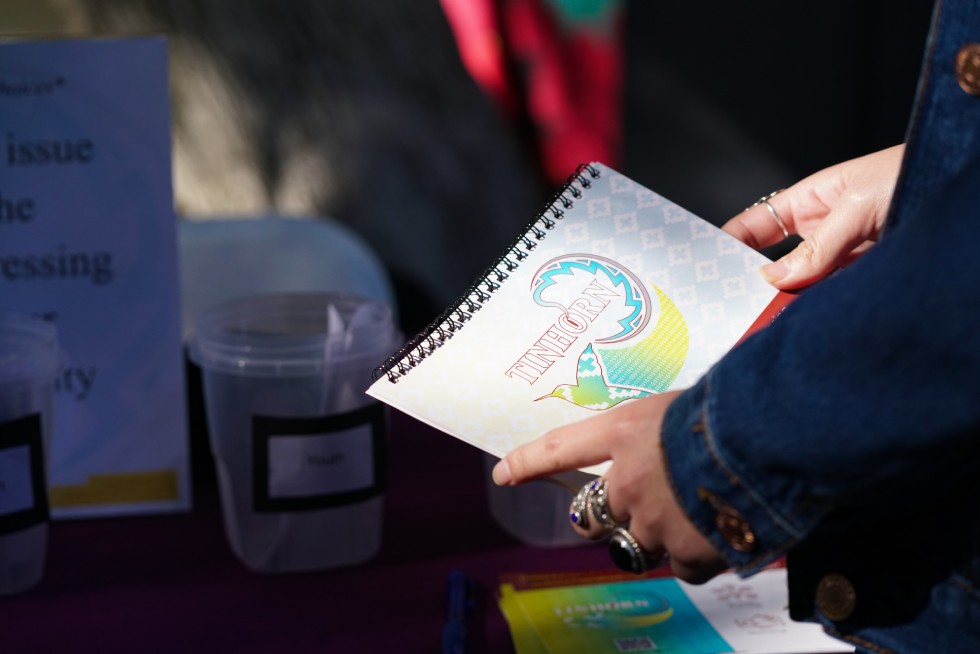
by Tinhorn Consulting | Apr 16, 2023 | Native Issues
In a poll recently conducted by Tinhorn Consulting, Arizona tribal entities weighed in and identified the top issues they faced (in order): 1. Infrastructure; 2. workforce development and education (tied); 4. culture; 5. healthcare; 6. youth; and 7. elders.
By conducting this poll, Tinhorn Consulting wanted to understand the issues and tackle solutions.
When asked how Tinhorn Consulting’s services might help, participants emphasized the need for a plan (strategic planning), more ‘how-to’ and ‘hands-on’ approaches (training and facilitation), and information about available resources (marketing). Of the four services offered by Tinhorn Consulting, strategic planning was the most common choice selected at 39%, followed by training and facilitation at 37%, tribal connecting at 18% and marketing at 3%.
Overall, participants focused on the need for community input and involvement; more inclusive training; a need for connection – within and outside of the community; and most critical — sharing information and increasing awareness. As I deliberated over the comments, I recognized the common factor underlying all the issues and solutions: information. Organized information; how-to information; information about goods and services; and contact information to connect to those who can help.
Information is power. Sharing information can counter negative perceptions and distrust. Sharing information can help solve problems. Sharing information can be healing. Sharing information helps to move the needle forward.
At Tinhorn, my aim is to help tribal clients tackle issues and self-identify solutions that include defined goals, opportunities to enhance expertise, and maximize information-flow to perpetuate continual growth and success. I call this the ‘solution needle.’ With a broader understanding of what issues Arizona tribal entities are most concerned about, Tinhorn Consulting is ready to work with you to move that solution needle forward.
Tinhorn Consulting would love to hear your feedback. Please share whether you agree or disagree with this ranking of pressing issues facing Arizona tribal communities. And if you identify a different issue, how can Tinhorn Consulting help you?
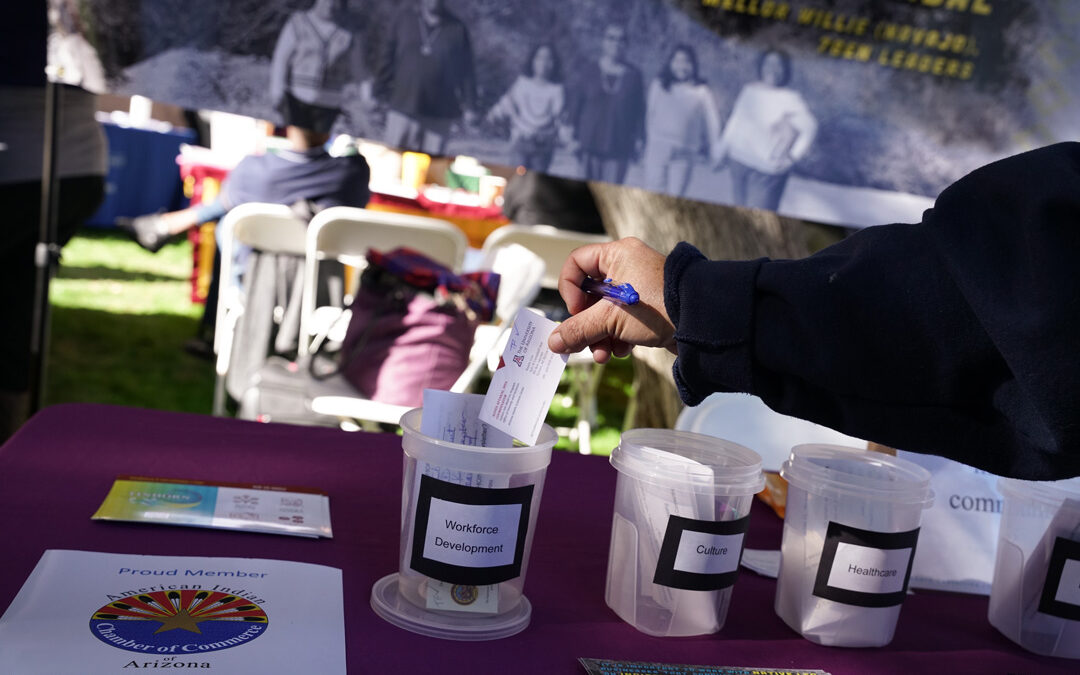
by Tinhorn Consulting | Mar 20, 2023 | Native Issues
We, as Native people, often deal with systemic problems that can seem overwhelming. Problems can often seem like a broken record, stuck in one place and unable to move forward. How can we, as Native people, move that needle? That is the question I asked myself at the beginning of this new year.
As a business owner working with tribal clients, I wanted to know: What are the most pressing issues facing Arizona tribal communities and organizations? And, how can Tinhorn Consulting help tribal entities move that needle forward?
To gain insight into Arizona’s tribal landscape of needs/priorities, Tinhorn Consulting recently conducted a random polling of issues, voted on by attendees at the 2023 Arizona Tribal Legislative Day at the Arizona State Capitol. Included among the participants were tribal leaders, nonprofit organizations, and general tribal attendees.
Tinhorn identified 7 general categories – healthcare, youth, culture, workforce development, infrastructure, education and elders – from which participants chose an overall number one priority. In addition to voting for one issue each, participants were asked to evaluate how Tinhorn Consulting’s services – – strategic planning, training and facilitation, marketing, and tribal connecting – – might help them tackle their issue.
The top issue receiving the most votes was infrastructure with 22%. The next two top votes – workforce development and education – tied at 17%. The rest of the issues received the following percentage of votes:
Culture: 14%
Healthcare: 12%
Youth: 9%
Elders: 9%
Admittedly the results initially surprised me. However, as participants explained why infrastructure was a top choice, they cited the broad need for internet connectivity, electricity/power, and access to services for the elderly. Basic services that can help support and lead to solving other problems.
Makes sense! Now, how to get to a solution? How can Tinhorn Consulting help move that needle forward?
Arizona tribal voices spoke up and voted for their top choices. Answers revealed in Part II of this blog. Stay tuned!
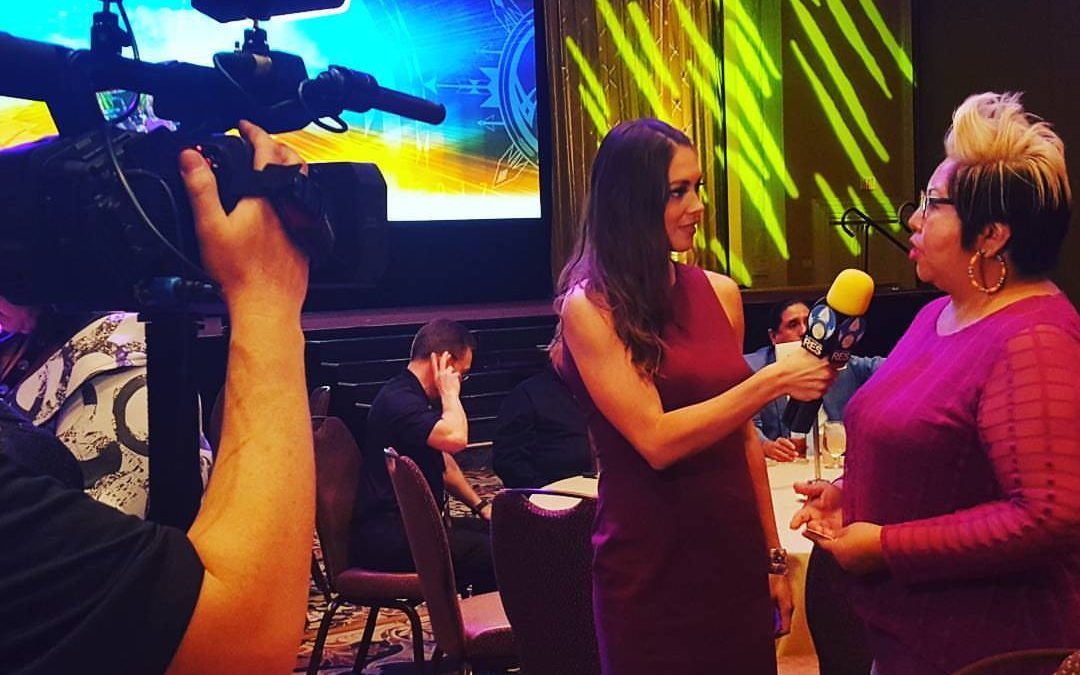
by Tinhorn Consulting | Oct 19, 2021 | Entrepreneurship, Women Warriors
It all began with an unplanned visit to the Smithsonian “Girlhood (It’s Complicated)” exhibit which commemorates women suffrage and how girls changed history in the five areas of education, work, health, news and politics, and fashion. Each milestone display spoke of opportunities for girls being delayed or absent in these five key areas until there was a breakthrough. Slowly, I began to connect the dots as to why Native women are paid only 57 cents for every dollar paid to White, Non-Hispanic men.
While there were Native American women included, there were only five pieces in the entire exhibit which consisted of hundreds. So, here is my #thisiswhatyoumissedsmithsonian list! Each lady featured has broken barriers in at least one of the five exhibit key areas and made their mark within and beyond Indian Country.
“Americans have claimed girls’ bodies as community property.”
Education
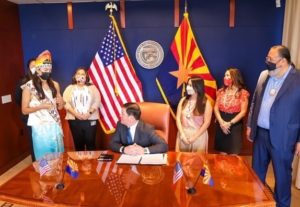
Lourdes “Lulu” Pereira. Photo by Ms/Mr. Indigenous ASU Committee on Facebook.
I first heard about Lulu, now Miss Indigenous at Arizona State University, when she was fighting gender and racial discrimination at her high school graduation. She was banned from attending graduation because she wanted to wear her tribal regalia to the ceremony. This reminded me of the “Girlhood” Smithsonian exhibit and how school dress code policies are targeted primarily towards girls. Restricting the expression of young girls’ clothing, especially when it promotes their cultures, takes away their independence and identity. Since then, Lulu has been instrumental in changing policies so that school graduation dress codes are more culturally inclusive first in her own school district and now state-wide. Her advocacy and activism in academic institutions reminds us that representation does matter. Follow her journey at the Mr. and Ms. Indigenous at ASU Facebook Page.
Inspired by Lulu?
If you’re interested in starting or returning to a college experience that is culturally grounded, Tohono O’odham Community College is now extending free tuition for all Native American students affiliated with federally recognized tribes.
Work
Featured Indigenous female disrupting work barriers: Kamia Begay (Diné) of Nizhoni Soaps
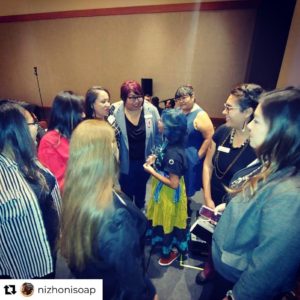
Kamia Begay. Photo by Nizhoni Soaps.
Currently 13 years old, Kamia is, to our knowledge, the youngest Native girl soap boss to own three brick and mortar stores spanning across the Arizona and New Mexico state lines. I first met Kamia at the American Indian Chamber of Commerce of AZ holiday luncheon. I remember her thanking me and the other entrepreneurs for being women she could look up to as Native women business owners. I am proud of her because she had the courage to open up her brick and mortar stores during the pandemic. Her story touched a special place in my heart, too, because she’s on this business journey with her mom. You can purchase Kamia’s skincare online at www.nizhonisoaps.com or at her three stores located in Farmington, NM; Albuquerque, NM, and Mesa, AZ.
Motivated to be a boss babe like Kamia?
Follow @NativeWomenLead to learn more about funding opportunities and to be in the know about the #EqualityCantWait Challenge!
Health
Featured Indigenous female disrupting health barrier: Sareya Taylor (White Mountain Apache and Diné)
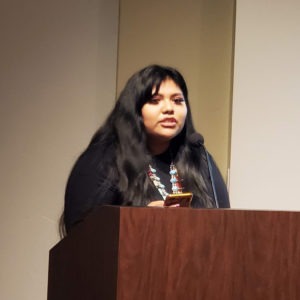
Sareya Taylor.
Sareya was the Inaugural Youth Poet Laureate of Phoenix. I had the privilege of hearing her read some of her original pieces at the Heard Museum. Sareya’s warrior spirit came through as her poetic flow painted images of urban Native experiences with pride. I am inspired by Sareya’s activism and how she uses her words to bring light to silent issues that impact our communities like mental health.
Uplifted by Sareya?
Learn more about Sareya by watching the Eat, Learn, and Grow episode “Words Matter” https://youtu.be/MckpT3mnVGY
If you or someone you love is being affected by domestic violence or is in need of mental health support, please contact the Southwest Indigenous Women’s Coalition at www.SWIWC.org.
News + Politics
Featured Indigenous female disrupting news + politics barriers: Alyssa London (Tlingit)
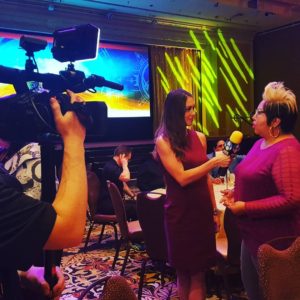
Alyssa London. Photo by Tinhorn Consulting.
I first learned about Alyssa on social media as she was the first Alaskan Native to win the Miss Alaska Pageant. She was an interesting combo of Standford grad, former Microsoft employee, and Culture Story business owner. In other words, someone I’d like my little girl to know of as a fellow bi-racial Indigenous female breaking cycles. Call it “like attracting like” as I had the pleasure of getting to know Alyssa when she interviewed me at the Reservation Economic Summit and later cheering her on in person as she competed for the Miss USA Pageant in Las Vegas, NV. She stunned the audience in a beautiful red Tlingit designed gown during the evening gown competition. Alyssa would later replicate the full sized dress for Barbies which she gifted to my Zoey. Her children’s book “Journey of the Freckled Indian: A Tlingit Culture Story” resonates with my daughter and I as we are also biracial. Her work reminds us how important representation is, especially for young Native girls. You can listen to Alyssa on Native America Calling and catch her as an FNX TV show host.
Want to change the narrative like Alyssa?
Learn more about Alyssa by watching the Eat, Learn, and Grow episode “Taking Risks to Follow Your Dream” https://youtu.be/FNo0Rmzpdko
Fashion
Featured Indigenous female disrupting fashion barriers: Valentina Aragon (Diné) of ACONAV
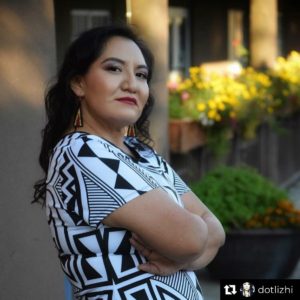
Valentina Aragon. Photo by Dotlizhi.
The blended identities and cultures of Valentina and her husband Loren (Acoma Pueblo) make ACONAV what it is. Their high-end Indigenous fashion has been recognized and featured across Indian country and beyond. ACONAV has walked the Phoenix Fashion Week, won Phoenix Fashion Designer of the Year, and a custom design has even been commissioned by Disney! “Evoking the Empowerment” of women is a conscious choice which has ripple effects into our next generations. I’m also impressed by the notion of working with your partner and mother-in-law. The success they’ve achieved is a testament to the importance of healthy relationships and kinship.
Inspired to be a fashion disruptor like Valentina?
Shop couture or ready-to-wear styles at www.aconav.com.
“American citizenship is not always desired. As members of sovereign, independent nations, American Indian families raised girls to pass on their languages, values, and traditions. In response, U.S. educators physically removed girls and boys from their homes and communities. These educators wanted to erase Indian cultures. And, yet again, the key target was girls because Anglo educators also believed girls would raise the next generation.”
This topic made me pause and give thanks and appreciate all the grandmothers who came before us to fight for saf(er) spaces in education, work, wellness, politics, and fashion. We have a ways to go, but it continues with young women like this and sharing their stories. As a mother, that’s our responsibility, just like my mother did for me. We all came from a woman and must have respect for women. No matter your gender, the way we treat and support Native women impacts our present and future as we raise the next generation.
Inspired to take action towards wage equality?
- Buy Native
- Promote Indigenous Women in the Workforce
- See something, say something
- Mentor
- Listen
- Share this blog
Sources:
Smithsonian “Girlhood: It’s Complicated” Exhibit
https://www.si.edu/exhibitions/girlhood-its-complicated-event-exhib-6376
https://piper.asu.edu/nea-big-read/partners/lourdes-pereira
https://www.nizhonisoaps.com
https://youtu.be/MckpT3mnVGY
https://alyssalondon.com
https://youtu.be/FNo0Rmzpdko
https://www.aconav.com

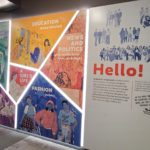

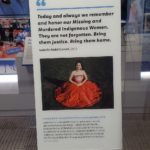



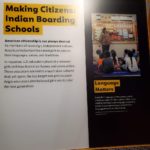
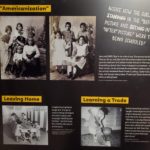
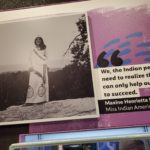

—
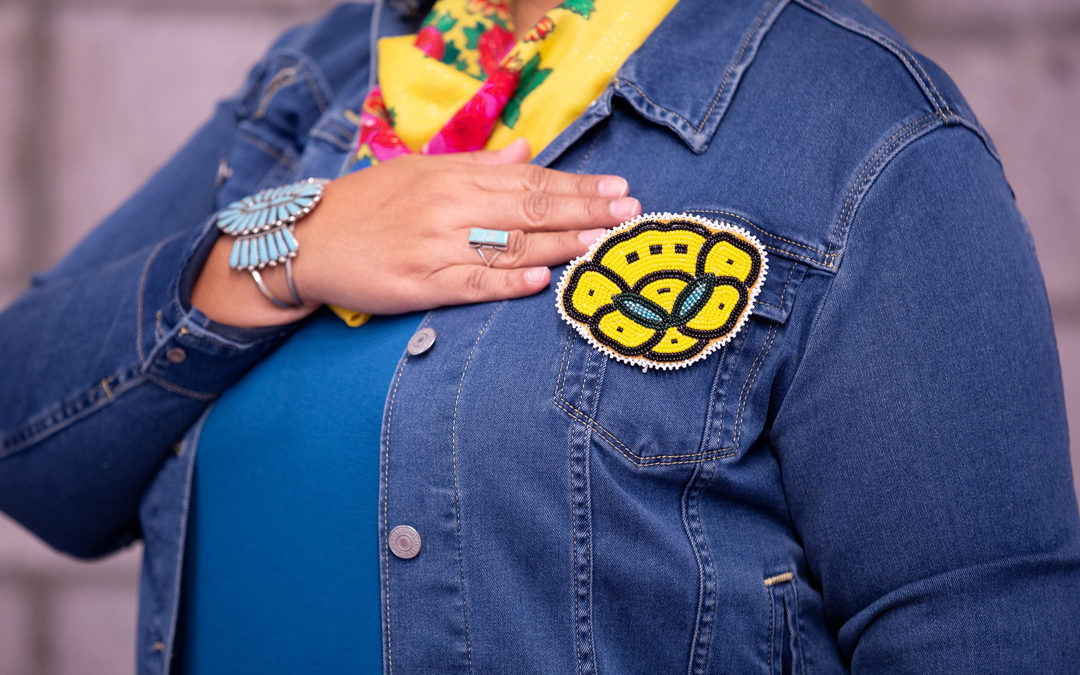
by Tinhorn Consulting | Nov 4, 2020 | Entrepreneurship
TINHORN’s Gratitude Checklist
-
Start your day by saying “Please.”
-
Next, say out loud three (3) things that you are grateful for
-
Keep a daily gratitude journal or add an AM and PM gratitude check-in to your daily planner
-
Check if you’re in H.A.L.T. (Hungry, Angry, Lonely, Tired) and take care of those needs STAT.
-
Be kind in thoughts and actions to yourself and others.
-
End your day by saying “Thank you.”
This month, TINHORN is celebrating gratitude. For our Indigenous heritage and for our freedoms. On my mind today more than anything is our freedom of choice. Growing up on the Hualapai reservation, I saw myself as a member of my community and as a Native American. It wasn’t until I worked on an Air Force base in Germany as a civilian computer scientist that I realized there were so many freedoms at home that I took for granted. Don’t get me wrong, our nation is far from perfect. But that’s the beautiful thing about it: we have choices and can use our voice through community action, social media dialogue, and voting to make things better for Native people and “something other(s)” who are often forgotten.
The best way to stay grounded is by practicing intentional gratitude. Whether you prefer meditation, journaling, or community service, staying grateful is key to sustaining oneself through uncertain times. No matter the outcome of the elections or world events, let’s make an intentional choice to stay grateful. Let’s show gratitude for the strength of our ancestors and live a life of gratitude as we make the future a better place for the next generation.
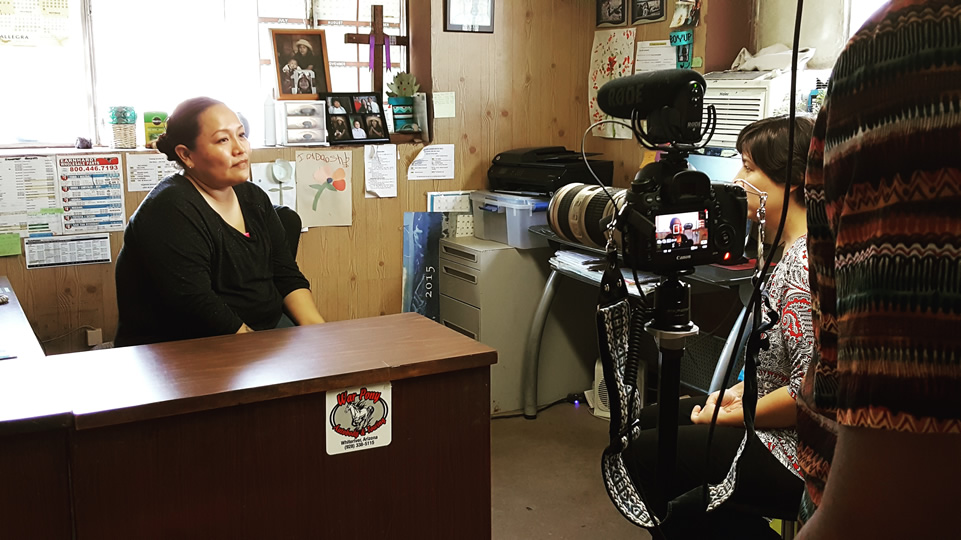
by Tinhorn Consulting | May 3, 2018 | Entrepreneurship, Women Warriors
Among Native cultures, women are celebrated as the core of family and community life. But what is known about women as entrepreneurs and the impact we have on the local, tribal and global economy?
It’s a fitting question as we come to the end of the 2018 National Small Business Week that began April 29th and ends May 5th.
Recent economic analyses indicate that women’s entrepreneurship is on the rise.* Native American/Alaska Native women-owned businesses are a significant part of this unrecognized economic engine. Over a 20-year period, Native women-owned business grew at substantial rates and contributed billions in revenues (see sidebar).
Other economic data suggests women are also more likely to invest their incomes back into their homes and communities, despite lower wages. It’s estimated that women reinvest 90 percent of their incomes in their families/communities, as compared to 30-40 percent for men. Also, while women perform 66 percent of the world’s work, the earn only 10 percent of world’s income (https://dreambuilder.org). In 2017, two-thirds of Native women were family bread winners, yet only earned 57 cents compared to $1 for white non-Hispanic men (http://nativewomenlead.org).
This is important and compelling information for all tribal communities, as business promoters and consumers. Even as entrepreneurship is growing, we can do more to achieve parity and help our communities address social ills. Whether you support the breakfast burrito lady, buy traditional clothing made by your sister or grandmother, or contract the woman-owned engineering firm, you have the power. Invest in Native women-owned businesses and they will invest back in you, our families/communities and the economy.
Key Trends about Native Women-owned Business (1997-2017):*
- Women engaged in entrepreneurship grew at an extraordinary rate of 114 percent over 20 years; that rate is more than four times higher – 467 percent – for women of color.
- Native women-owned businesses grew at a rate of 201 percent.
- Native American/Alaska Native women created 15 new business firms per day.
- As of 2017, Native women owned firms account for 1.4 percent of all women-owned businesses; an estimated 161,500 firms and employing more than 61,000 workers.
- As of 2017, Native women-owned firms generated an average of nearly $690,000 per firm and an overall $11 billion in revenues.
*Source: “The 2017 State of Women-owned Business Report.” Commissioned by American Express. Http://about.americanexpress.com/news/docs/2017-State-of-Women-Owned-Businesses-Report.pdf.
About Tinhorn Consulting, LLC:
Tinhorn Consulting, LLC is a full-service integrated marketing and communications firm specializing in telling clients’ stories in the most powerful way that has a lasting and far-reaching impact. Tinhorn Consulting, LLC works with clients from a variety of industry sectors, including health, government, education, nonprofit and business. Tinhorn Consulting LLC is a 100% Native American woman-owned business. For additional information, contact info@tinhorn-consulting.com.





















